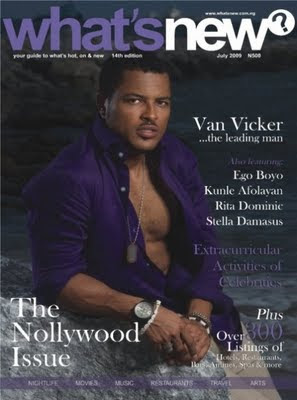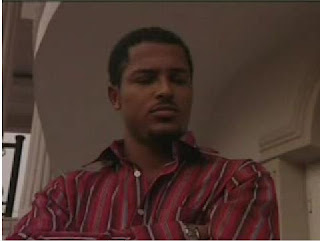OMG ! HOW I KEEP MEN AWAY BY SUPER MODEL DAYO BABATUNDE!
| |
| Written by Bridget Amaraegbu | |
| Saturday, 17 January 2009 | |
| She stands a little above six feet. And when she walks, it is with such grace that you can’t but look in her direction. Be it in on the runway or on the streets Dayo Babatunde the Naomi Campbell of modern day Nigerian fashion industry is a sight to behold. Dark in complexion Dayo succeeded in a world where it was a crime not to be fair or outrightly put, an Oyibo to become a model. She shares her experience as one of the oldest surviving models in the country. With more than two decades of experience in the kitty Dayo seems to have seen it all in a world where some model lives in a world ruled by fun seeking men who would do anything to get between their legs. Enjoy: Before now you were one of the top models in the country, but you’ve been out of circulation, what happened? What inspired your going into modeling, was it your height? My height yes, but that wasn’t what actually pushed me into modeling because I didn’t even know that height had anything to do with it. It was actually people that made me go into it. Before I went into modeling I was young and people kept asking if I was a model and I’ll say no. Many of them asked me to try and get into it. That was how I developed the interest and started asking questions on how I can go about it. It was when I met with Yemi Fawah who was managing a modeling school then that things began to shape up. I went through her school and she did all she could to put me in the right place. What was modeling like in Nigeria when you came into it? At that time, modeling in Nigeria was fantastic. We were more into fashion modeling even though we also did photo modeling for bill boards, calendar’s and magazines. So because we were more into fashion, we had something to showcase almost every weeks end. We had international organisations coming to Nigeria to hold fashion shows as well as some local organistaions too. For us it was a lot of fun because we were making some little money which was enough to cater for our needs and we were living big. The difference was that we were not thinking of going international because we were popular which was equally good for us. Do you think modeling in Nigeria has changed from what it used to be in those days? Yes, today it has gotten much better than it was in those days. Today Nigerian models are doing very well both at home and abroad. They earn foreign exchange which is good for the country aside that, people are more respected in this field today. These days parents encourage their children to go into modeling, beauty pageant etc. Aside modeling, everything entertainment is a lot better today. Can you tell us some challenges that goes with modeling? A lot of challenges. This industry requires a lot of patience, focus, integrity, discipline and diplomacy. In this business you come across different people mostly wealthy men and women, but if you’re not careful or focused then be prepared to miss your track. Apart from the glamour that goes with being a model, you will also meet a lot of men who make passes at you because doing modeling job exposes all the feminine aspect of you and most men will want to take advantage of that. It takes a great sense of discipline, focus and integrity to be able to stand tall in this business. Offers from men could be a very serious hurdle because if you are not careful, you’ll end up going with the men. One major challenge that almost killed our dream in those days was the issue of complexion. Most designers preferred light skinned models and I’m dark skinned but I was lucky because my height and figure was outstanding while other models had the complexion, none of them had my height. I also had a very unique look. In fact most people called me Grace Jones so that way I was able to scale through that aspect. Then it was difficult to mention the 1st, 2nd or 3rd models in Nigeria without mentioning Dayo Babatunde. Complexion was a serious barrier that affected most models but I thank God, it didn’t affect me because of my height. I also tried my best to ward off passes from men because I knew where I was going. I took modeling as my job while some were in it for the fantasy alone. Before now people made jest of persons as tall as yourself, did you have any such encounter? No. I’ll tell you something, I’m a very graceful person so I never got any nasty comments on my height. Instead when I walk on the streets you’ll see cars parked to know who this person is, but then I was much younger anyway. Even now I don’t think I look too bad but then anywhere I go to, people will want to know me because I have this carriage and body structure that is very outstanding. How long have you been in this industry? I started modeling when I was 18 and right now I’m in my mid forties. But I stopped being on the run way like five years ago and since then I’ve been training models. Now I manage a fashion house called Dayo’s Collection and I’m now more focused on building and training models and creating awareness for my outfit. Do you think modeling in Nigeria still needs improvement? Yes I think so because the industry still needs to be tapped into. Right now I’m doing a reality show to empower models and winners will equally emerge (a male & female). This empowerment will help them to go out for international competitions, become brand ambassadors for companies like Guinness Nigeria PLC did with Michael Power. We want to ensure that our models can stand the chance to become brands for multi-national companies. This reality show is also aimed at bringing models together, promote modeling business in this country, encourage upcoming models and empower them by teaching them the rudiments of the job. We also want to see how we can build models who will become ambassadors for this country. We will assess their catwalks, fashion sense, eating habit, grammar and so on. At the same time it will serve as a foundation for my modeling academy which I already have in line. I’m still talking to some state governments and individuals who have interest in this business. And very soon by God’s grace this academy will materialise. The reality show will be on air for about two and half months and we hope to house 14-18. I’ve had this in mind ever before now, but there was no encouragement but right now I think I’m the right person to start it. I just have to start. During this reality show, we’ll have guest speakers who will on topics ranging from health, contracts and the disadvantages and advantages of this business. The reality show is tagged Top Model Standing. Going by your experience, I’ll like you to rate modeling business in Nigeria? In this business we have the likes of Oluchi, Bisi Sobowale, whom I trained and she is doing very well for herself. If I have to rate modeling business in Nigeria, I’ll give it 40%. That means there’s a lot of work to be done?. Yes. First we need a modeling association, it existed during the time of Yemi Fawaz but at a point she left the country and the association died. I know we have modeling agency but I can say they are not doing much. If we have an association, we’ll be able to move this industry forward because the agencies are more interested in getting the contract and making their commission leaving the model in question with a little change. Through this reality show I want to create a network for all the models in Nigeria so that we can easily interact with our international counterparts. By doing this we can organise our shows by yourself. If you were asked to inject one idea that may improve the industry, what’s the first thing you’d do? I’ll start from letting the models understand the rudiments of the job and letting upcoming models know the qualities of a model. As a model, do you believe in a feminist society? That’s a big question. Yes I believe in women because I’m a woman but I’m not taking away the rights of the men. In the modeling world right now, we have many handsome men in the business so its not just the ladies world anymore. I can say it’s at a 40-60 ratio, so the guys are doing well too in the field. Do you have any favourite designer? Yes I like Nigerian designers. I like Labanela for the class of people she designs for (older people) and I like Frank Oshodi who designs for the younger people, I also like Nobel for his original designs. What’s your love life like? I have a relationship that’s been on for about eight years and we are still very close. I also have a very handsome son who is about 12 years old but I am separated from the father. I’m not a party person instead, I like going to the beach with my friend and my son (just 3 of us). I love to treat myself to very good food at home. My love life is very private and I don’t want to expose it. Yes, why not if it pleases God. Every woman wants to live under a man’s roof and I’m not an exception. I know I’ll make a very good wife because I’m very humble, respectful, tolerant and very easy going. You can see I’m very tall so I want a tall man who is well structured. He should be about my age and not younger. He must be a God fearing man. And above all, he has to be handsome, loving and ready to accept my son because my son comes first before any other person. |



Comments